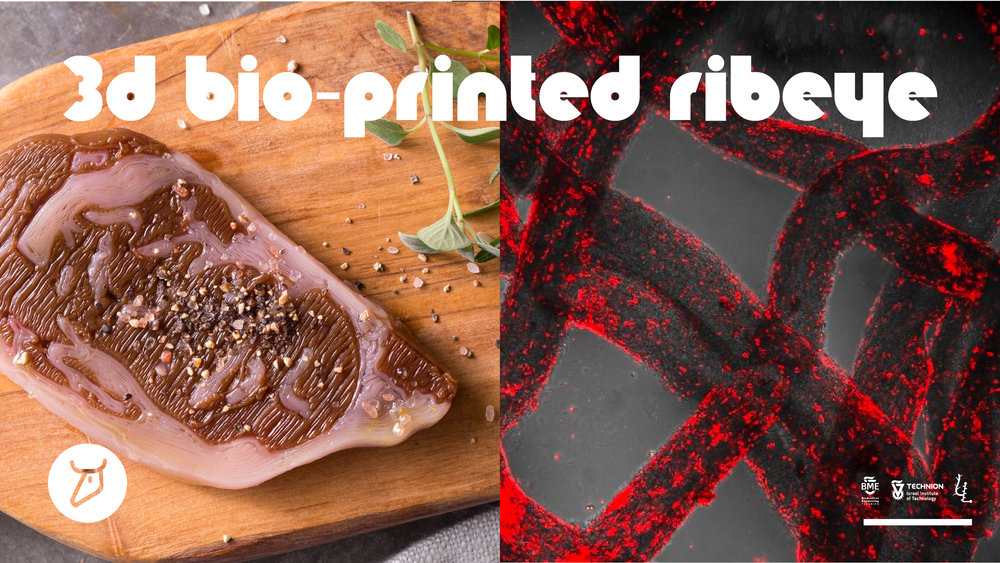One of the flagship items on any restaurant menu, from local diners to Michelin-starred restaurants, is almost always ‘steak.’ However, in an environmentally-conscious society, it is essential to find an alternative to overcome the environmental issues that stem from the ever-increasing demands for meat-based products.

Image Credit: Aleph Farms
On its journey to building sustainable, equitable and resilient food systems, Aleph Farms has developed a 3D bioprinting process that is able to reproduce almost any cut or type of steak. This novel bioprinting process was developed in collaboration with the Department of Biomedical Engineering, Technion, at the Israel Institute of Technology. Aleph Farms and the researchers recently published their progress in the journal, Biomaterials.
Aleph Farms' steaks are grown with expert guidance with the overall aim of delivering the same nutrition, taste and sensory experience as a traditional steak. Such a process could become an adequate solution to the rising meat product demands and their global consequences.
3D Bioprinting Plant-Based Materials
The 3D bioprinting platform developed by the team facilitates a bottom up assembly of a structured piece of steak using its natural building blocks – the cells. The cells are able to continue their development once the 3D bioprinted muscle tissue is incubated, this interaction replicates processes that happen inside the cow’s body.
When constructing the structures from the building blocks, a significant challenge that emerges lies in switching out the extracellular matrix that supports the growth of the muscle tissue, which is naturally made of animal proteins.
However, Aleph’s team has developed materials classed as non-animal derived, i.e., plant-based materials, that could offer a more sustainable source, all while replicating the necessary properties that facilitate the growth and differentiation of the cells into structured muscle tissue and the preferred taste and texture that comes with eating a specific cut of steak.
In the engineering process we developed in the lab, we tried to mimic the natural process of tissue formation inside the animal’s body as much as possible. The cells successfully adhered to the plant-based scaffold, and the growth and differentiation of the cells proved successful as well.
Prof. Levenberg, the Biomedical Engineering faculty at the Technion
Levenberg and her team called upon their vast experience and background in medicine to create a proprietary vascular-like system. The result was a bio-ink that combines muscle and fat cells with a pea protein that acts as the scaffold.
Meeting the Demands of a Cultivated Meat Market
This particular process led the research team to reproduce a product similar in shape and structure to a ribeye steak.
Our bio-ink led to a consistent distribution of the cells on the bioprinted scaffold, promoting growth of the cells on top of it. Since we didn’t use any animal-derived biomaterials, our findings promise greater development of the cultivated meat market moving forward.
Prof. Levenberg, the Biomedical Engineering faculty at the Technion
Throughout testing, the team was also able to establish that the cultivated meat product presets an extremely low risk of allergic reactions as well as a good nutritional value that makes the product viable as a scaffold for upscaling, meaning that this plant-based not only benefits the environment but also circumvents health and ethical issues that stem from the rising demands for meat products.
The progress in the development of a bio-ink for the bioprinting process paves the way towards advancing the methodology needed to produce edible muscle tissue structures that satisfy consumer preferences as it unveils promising research.
Aleph Farms is committed to the project of food sustainability and preserving the planet through the development of environmentally sound meat alternatives. Through upscaling of projects like this, increasing demand could be met without increasing the stress placed on the planet.
In a time where the focus of the climate crisis is also around our lifestyles and food consumption, offering consumers more environmentally conscious choices is not only better for the environment but better for the future in the long term.
References and Further Reading
Ianovici, I., et al., (2022) 3D-printable plant protein-enriched scaffolds for cultivated meat development. Biomaterials, [online] 284, p.121487. Available at: https://www.sciencedirect.com/science/article/pii/S0142961222001260
Sustainability. (2022) Our Mission – About Us | Aleph Farms — Sustainability. [online] Available at: https://www.aleph-farms.com/about-us
Disclaimer: The views expressed here are those of the author expressed in their private capacity and do not necessarily represent the views of AZoM.com Limited T/A AZoNetwork the owner and operator of this website. This disclaimer forms part of the Terms and conditions of use of this website.